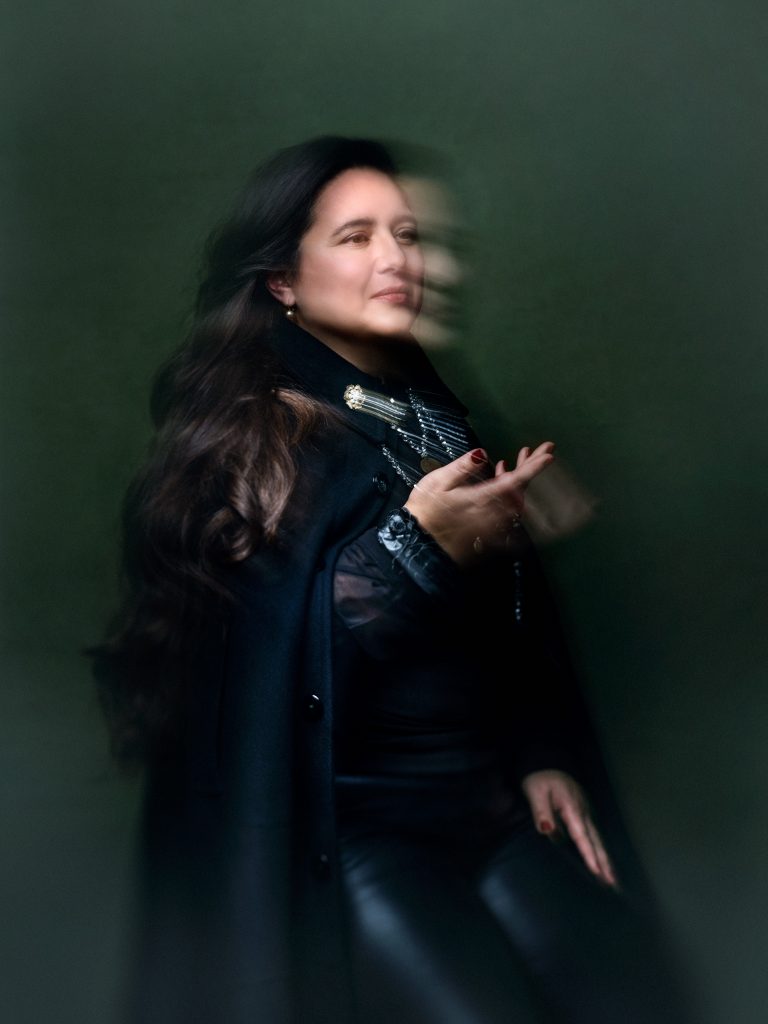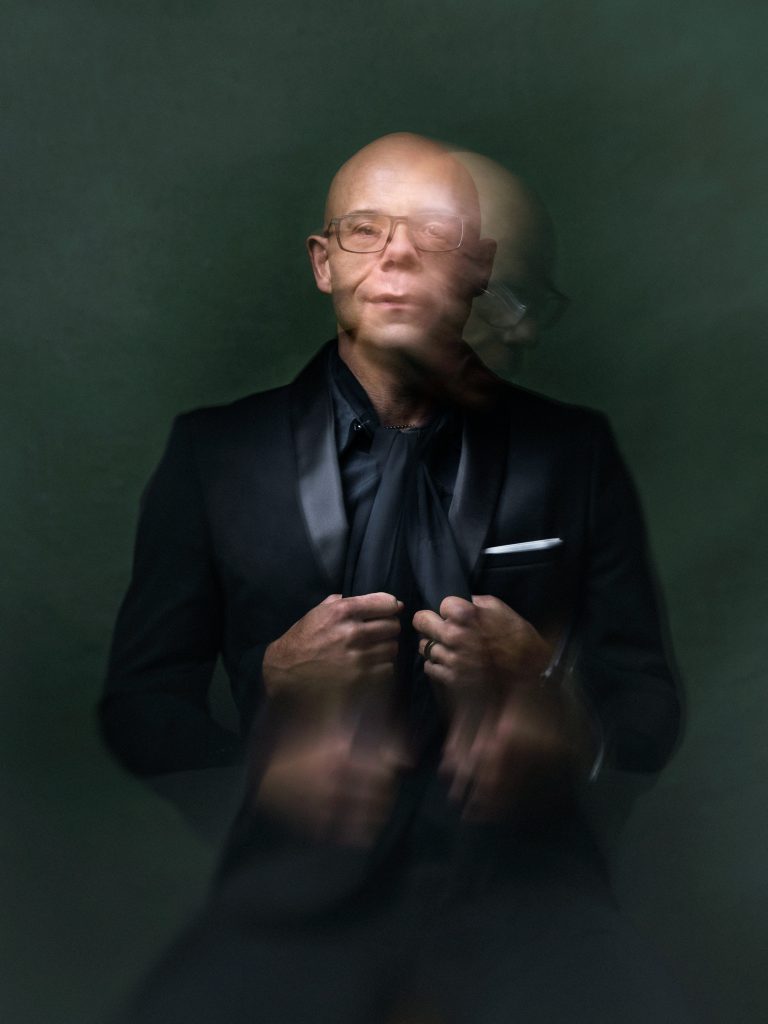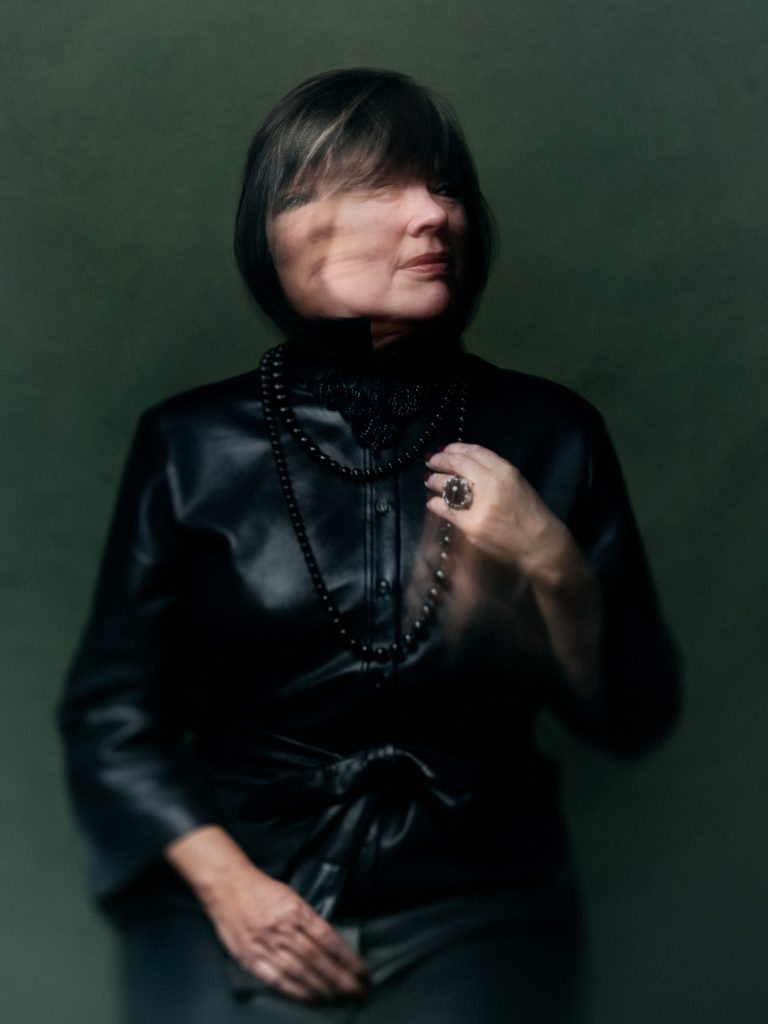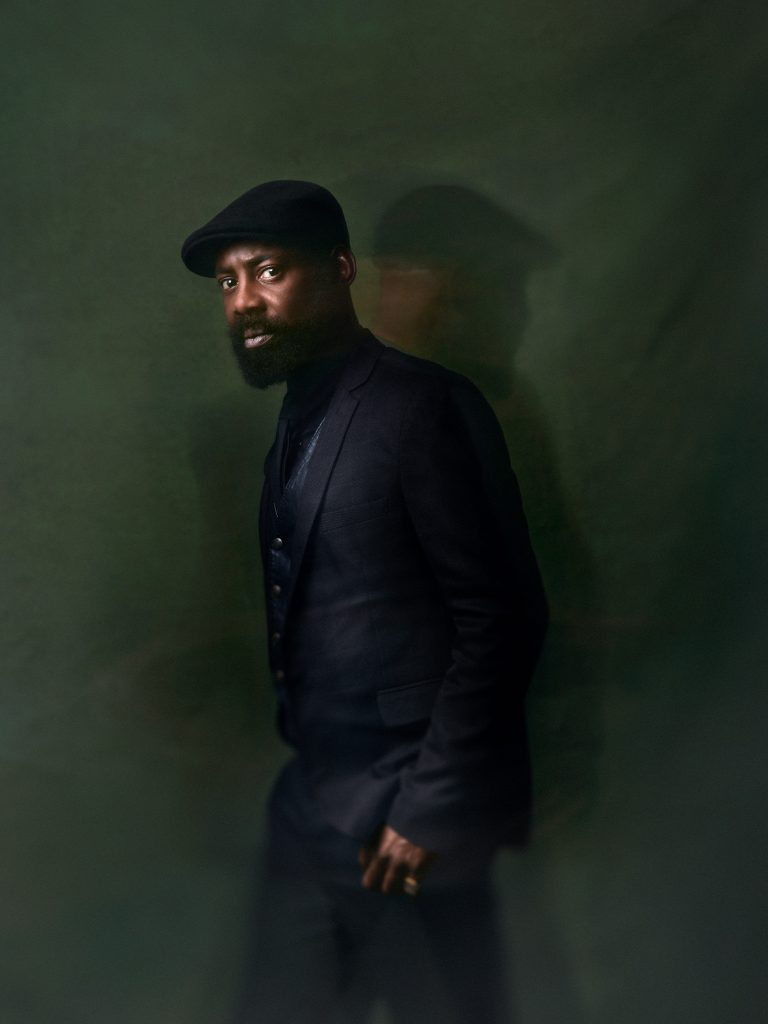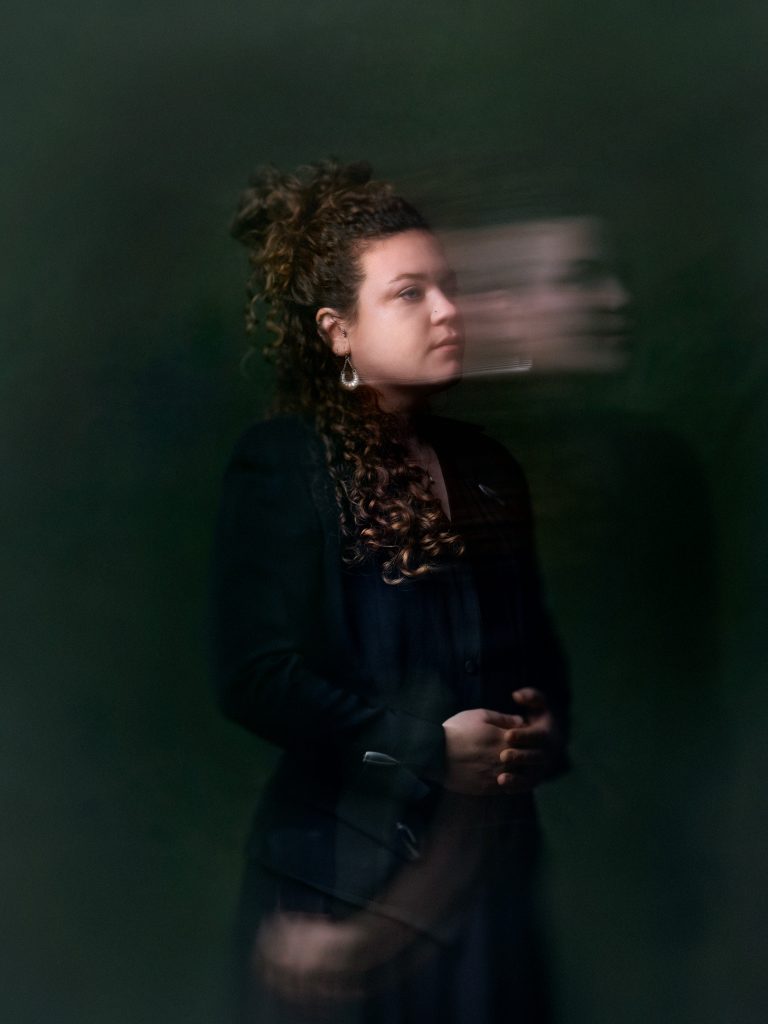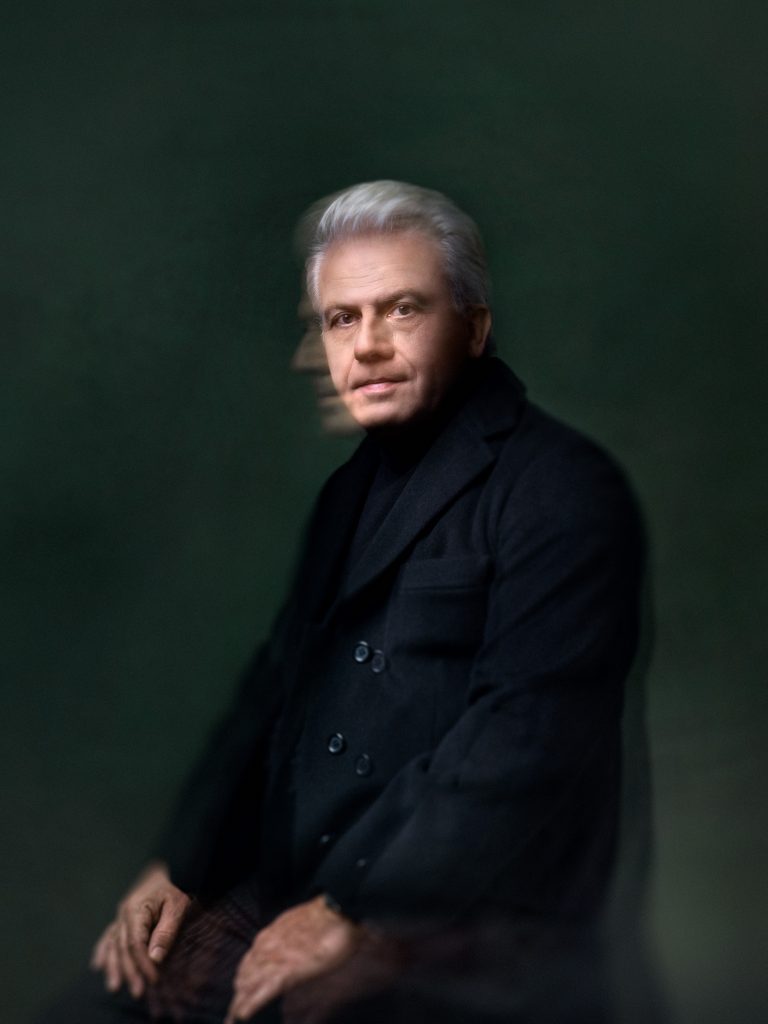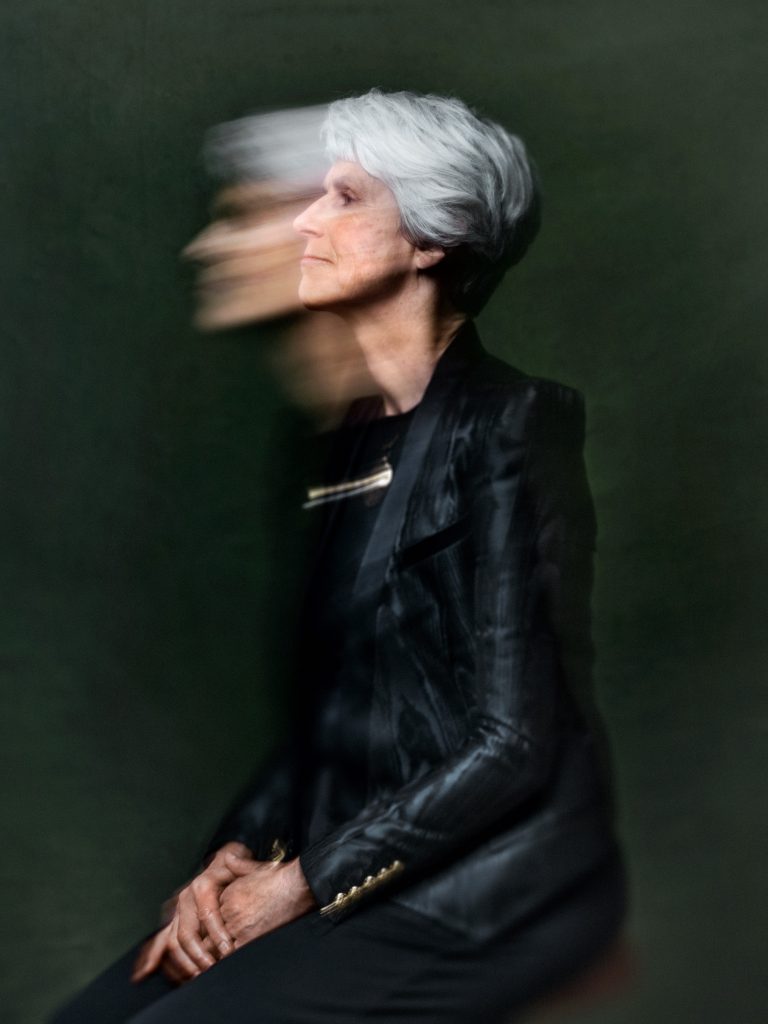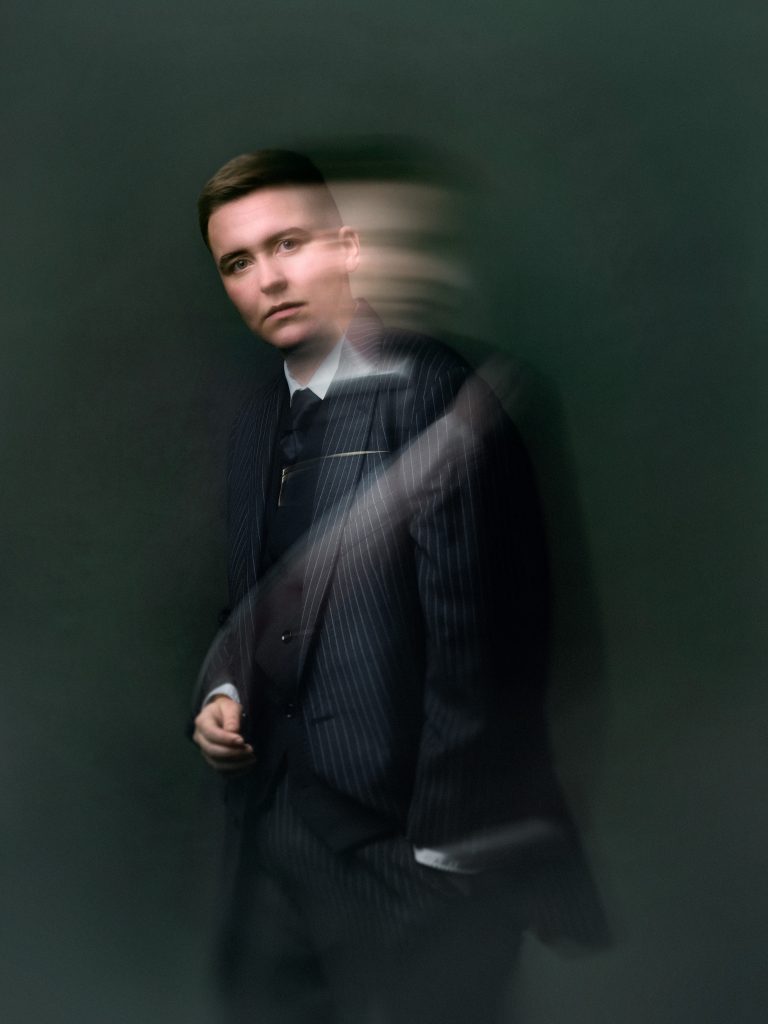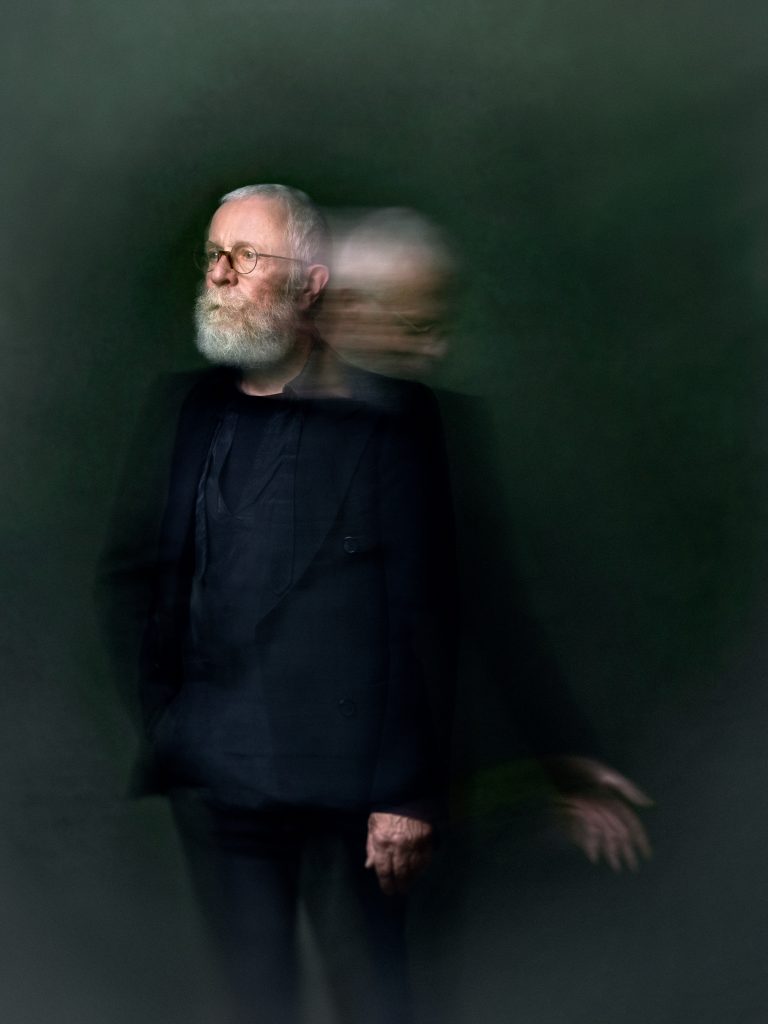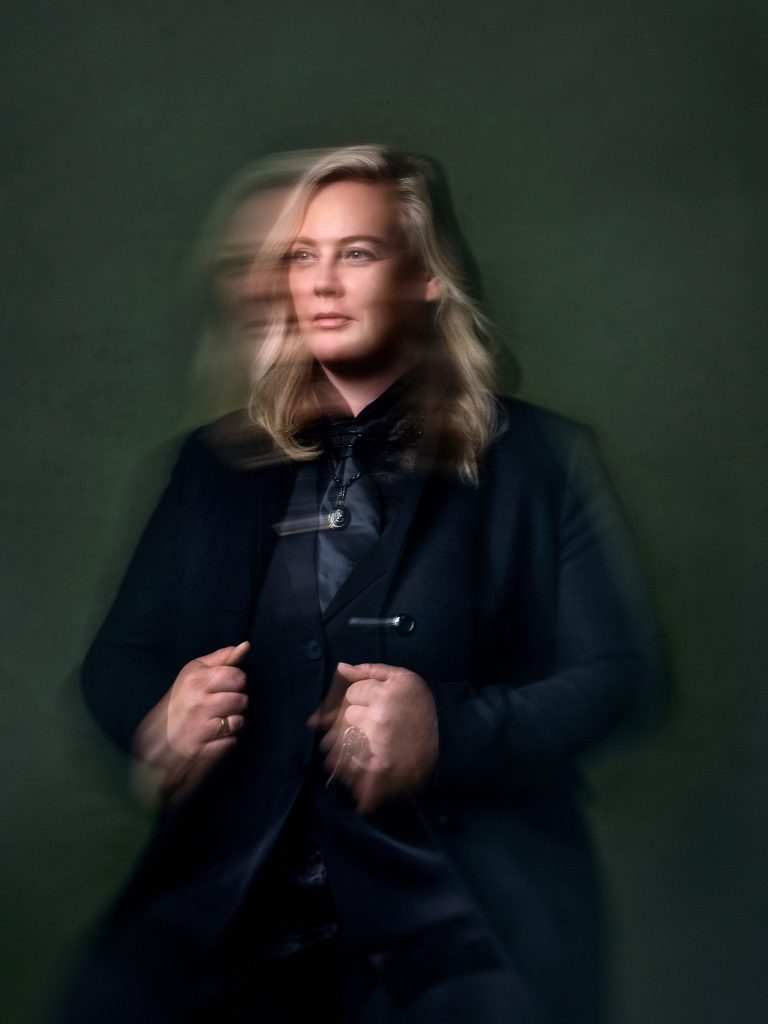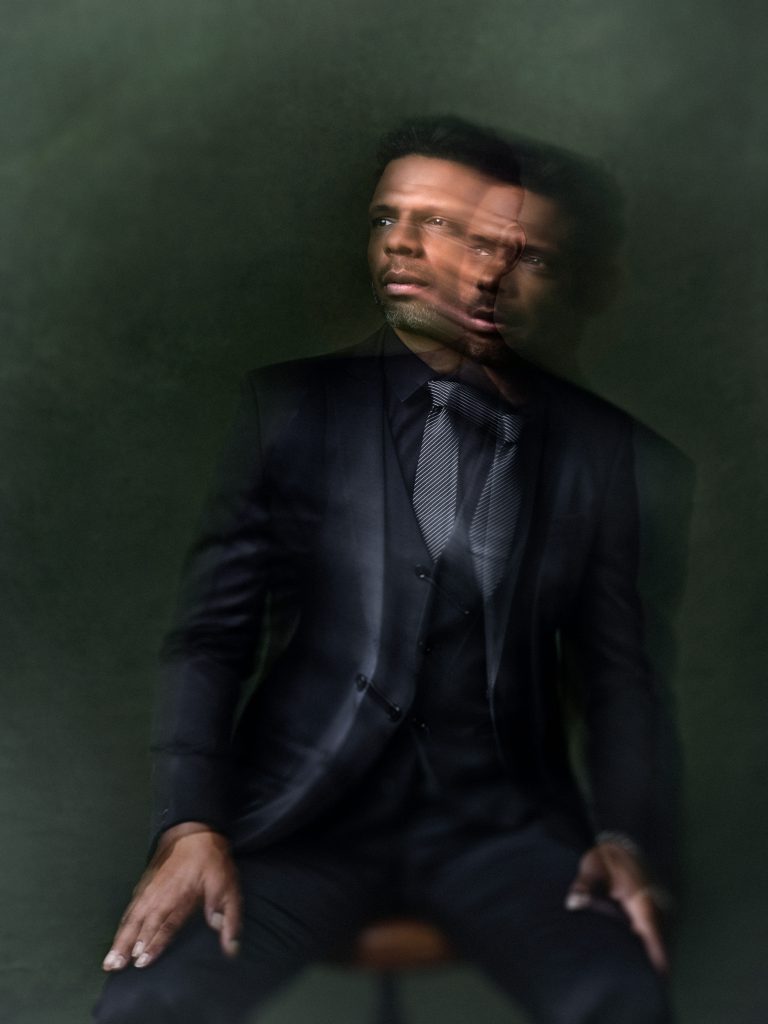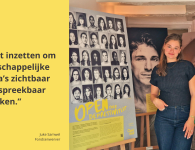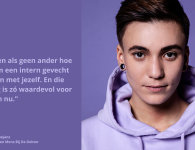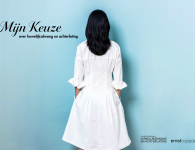Portraits and stories of COPMI | English
The nineteen impressive stories and portraits of COPMI, children of parents with a mental Illness and/or addiction Issues, can be read and seen here. Adults also fall under this term. After all, they always remain the child of their parents. For more information see CHILD OF
Jane – Luciën – Ildi – Annemijn – Ronald – Stanley – Linde – Paul – Douwe – Rosali – Anjo – Lincey – Noaz – Jaap – Sazime – Michael – Anne – Niel – Sevilay
Trying to save everyone
Jane, 42 years old
My mother could not give love, I think I knew that from a young age. I can’t remember her ever cuddling me. She was always jealous of me, of my friendships and my body. She told me that it was my fault that her body was destroyed. She was eighteen when she had me and she never saw me as a daughter. She didn’t see us as her children but as her extensions. We had to know what she wanted and provide it to her at all times.
Protect
I was the oldest in the family, my brother and sister were much younger. My mother got a new relationship, and soon they had fierce arguments. The tension was always palpable. He worked variable shifts, so he often had to sleep during the day. That meant we all had to be quiet, but that’s impossible with small children at home. There were always beatings. I tried to protect my brother and sister and my two stepbrothers against him, but his tyranny was too great. My mother always looked away when he got physical.
Rescuing
My mother was shaped by the traumas of her youth. Her father fought in World War II in Indonesia and she didn’t talk much about it, but she called her youth terrible. Therapists I’ve spoken to say my mother must have been a mild borderline patient with a narcissistic personality disorder. It has been my mission to save my mother, but I failed. I have said so many times, why don’t you talk to someone? But she didn’t listen. I also wanted professional help, but that was not allowed. She was afraid that I would say too much and that youth services would get involved.
Destroyed
Meanwhile my younger brother was slipping, he was displaying confused behavior and was suffering from psychosis. My mother denied that he was sick and forbade him from getting help. One day, in a psychosis, he killed my mother. He was 23 years old at the time. He was put in a mental institution and is still a danger to himself and others. I have always been the big sister and I have always tried to save everyone. He was my little brother and some part of me did not want to admit that he was gone. But he only responded to the same name, that was it. He was destroyed by our unsafe home environment.
Mourning for myself
I realized that I only recently started mourning. Mourning the death of my mother, but really mourning for myself. Mourning the girl I never was and who I wanted to be. Everything that made me happy, my mother made me feel stupid for. I have tried to process my mother’s habit of belittling me through trauma therapy. Every day I realize more and more who I want to be and what makes me happy. Many people don’t realize that you can still feel a lot of pain from things that happened in your childhood, even if you are 40 years old. It is not something you can easily get over, it takes a lot of time and therapy. By talking about it now, I hope that there will be more understanding of how growing up with parents with mental problems can have a lifelong impact.
Never give up hope
Luciën, 48 years old
My father was addicted to alcohol and my mother had mental health issues. My father would have outbursts of anger where he would hit my mother, my sisters, and me. Those moments were very intense and are forever ingrained in my mind. Later in life, I got completely stuck. In therapy, I learned for the first time what it means to talk and what it means to feel, but it’s still difficult to put my feelings into words. That frustrates me. I haven’t found a way to express many things that I feel.
Suppression
Sometimes I experience pain that I feel isn’t mine. I sometimes think that pain can be traced back to my family history: my mother was young when she experienced World War II, and in her family, the wounds of the war are palpable, and my father was Surinamese, there’s a painful slavery history there. I think I’ve unconsciously internalized that suppression.
Constant Threat
At home, I wasn’t allowed to show emotions. That was dangerous, because what if my father got angry again. Every day, my mother would panic and say “watch out, he’s coming home soon, don’t make him angry.” Actually, I was a very happy and extroverted boy, but I had to keep quiet. I think the most traumatic thing in my childhood was the constant threat. Maybe it’s a wrong comparison, but that threat can feel like a war zone. You never know when it’s coming, but that it will, you know for sure.
Fleeing
We fled to a shelter for victims of domestic abuse many times. I remember one time I was dragged out of my bed in the middle of the night and I had to run with my crying mother on the street. Her panic is still with me, but she never told me, being a little boy, what was going on. I didn’t understand why we were fleeing, she never talked about it. I had many bad experiences as a child, that time was very unsafe and as a person, you store things in your body. I still feel like I don’t matter.
Loyalty
My parents have always stayed together, for about forty years. Although as a child I mostly fled the house and spent a lot of time on the street, I lived at home until I was 25. After that, I became their caregiver. My mother had a stroke and my father had advanced Parkinson’s disease. My parents had social anxieties and lived reclusively. Out of loyalty I felt that I had to continue taking care of them, I couldn’t leave them by themselves. As a COPMI , it’s hard to speak bad about your parents, you don’t want to reject them. I loved my parents, despite my sadness and anger about their behavior.
Hope
What I want to tell others is: never give up hope. Let that anxiety talk, it will continue to do so, that’s what it does in my case too. But listen to the positive voice inside yourself. Give it space and give yourself the chance to get better.
There was no help
Ildi, 56 years old
Sometimes he said that he wanted to go to heaven when he was overwhelmed. My father was depressed and paranoid schizophrenic. I was a child and found it difficult to understand, but I always felt his stress and unhappiness. When I was twelve, he took his own life. He was born in Hungary and had to flee from the Russians in 1956. He grew up in the mountains of Budapest and was raised with an iron fist and demanding parents. He passed that demandingness onto me and my sister. Occasionally, when he was proud of me for playing the piano well, he would briefly hug me. That felt nice, but at the same time very unsafe, you knew that he would hit you again soon.
No help
I always had the idea that my father wanted me to be a child prodigy, only then would I get recognition. He hit me hard with a wooden spoon. Once I wasn’t able to sit for a week because of it. The teachers at primary school must have seen that something was not right at home, that I was being abused. But there was no help, never.
Indoctrinated
My mother comes from a strict Catholic family. I used to think that she was of some use to me. But I am realizing more and more that there was little connection between us, although I was always looking for it. As a child, I sometimes thought, I want to die. Then I looked at myself crying in the mirror and thought, this can’t be the point? A few years after my father’s death, my mother became psychotic. When I was nineteen and had a boyfriend, she forbade me from seeing him. He was not good enough for her. I hesitated but chose my relationship. I am still very happy with him. Looking back, I think, how could I have been so indoctrinated by my mother that I thought I was doing everything wrong?
Environment
In high school, I made friends who were truly there for me, and from that moment on, I have been fortunate with the people who came into my life. That environment has been my salvation. I still get a lot of support from my environment and my relationship with my husband. When I became pregnant with my first child, I felt very strongly that my children would have a very different upbringing, I wouldn’t burden them with my issues, they should be able to develop as independent individuals. You can ask them yourself if that was successful.
Own path
My mother has had psychoses and was hospitalized for a long time. I am now her caretaker and do it with appropriate distance. I make sure that I don’t become part of her illness like my father. I always try to put myself first, even though I still find it difficult sometimes. Whatever happens, or what the situation is, whatever feelings people give me, I embark on my own path.
The sweetest person
Annemijn, years old
I would have preferred not to be a child of a father with psychological problems, but I do think it made me very strong. I have noticed that there is a big taboo on COPMI. Nowadays, I talk about it more easily. As I have grown older and heard more stories from others, I now know that I am not alone. Even if I had been the only one: the person it concerns is the sweetest person I have ever known. So, why should I be ashamed?
Manic-depressive
From my sixth to my fifteenth, my father alternated between manic and depressive episodes. During manic periods, he had psychoses and no longer saw reality clearly, for example, he would put all his stuff on the street or only wanted to talk to us in English. When he was depressed, he would not get out of bed, he was so unhappy and ashamed of what had happened before.
Found
When I was seven, my parents divorced and I saw my father less. He was often hospitalized in a psychiatric hospital. He was not doing well. When I was fifteen, my mother asked me to stay for a moment before I went to work on a Saturday morning. She wanted to tell me and my brother something. I already sort of knew what she was going to say, I hadn’t spoken to my father for a week, he wouldn’t pick up. Her words I remember well. ‘Dad was found and he is no longer alive’. I didn’t believe it. Even though I had seen it coming, my brain couldn’t grasp it. I always felt that he would come back, that it wouldn’t be real.
Real
But it’s real. I have never felt anger towards my father. There is no one who has told me as often that he loved me and that I was the best thing that ever happened to him, as he did. The time my father was alive, it was all about him. I never stopped to think about how I was doing. Only when he passed away did I realize that I wasn’t doing well and that it had left its mark on me as well.
Uncomfortable
In my daily life, I don’t come across many people with a similar story. I notice that people find it difficult to start talking about it; they are afraid of saying the wrong thing or become uncomfortable. But it’s better if you just ask a question, this way it becomes more normal to talk about it.
Talk
Luckily, I have found a place where I can count on a lot of understanding. Together with three girls, I have set up a COPMI-group where more peers participate. It’s very nice to talk to people who have experienced similar things. I was a little afraid that what happened would influence my future, but I let that go. I don’t want my life to be determined by what happened.
Constant worry
Ronald, 41 years old
“Dad is a bit confused,” that’s what we heard at home. In reality, he was struggling with severe manic-depressive episodes. The first time I consciously experienced it, I was twelve. We were watching television together, like we always did. There was a lottery show on, and suddenly he started loudly shouting and cheering. He thought we had won the grand prize; he was ecstatic. But we weren’t participating in a lottery, we didn’t even have a ticket… It was so difficult for me to see him like that. I stomped and cried my way to my room that night, “This isn’t normal!” My mother took action right away. He was hospitalized that same day.
Strong connection
It was great when he came home after four months. But you could tell that he wasn’t completely there yet. It wasn’t until things became “normal” again that I felt relieved. When he went back to work and when he was standing on the sidelines on Saturdays, like he always did. Football brought us together, that was our thing. I never talked to my father about his illness. He avoided things that hurt too much. In later years, we got a very strong connection. Unfortunately, it didn’t last long; he passed away in his sleep from a stroke a few years ago. It’s terrible to miss him, but with his death, the constant worry about his health disappeared, and that brings peace.
Emotionally formed
As a child, I thought, “my parents already have enough problems,” so I tried to be as little of a burden as possible. As an adult, this has caused me some issues. Now that I am around people who have similar experiences, I realize that I have developed characteristics due to the situation at home, such as not being good at setting boundaries, feeling too much responsibility, and not being good at asking for help. I find it very comforting to know that there are more people like me. A lot of things fall into place without falling into victim mode or giving up responsibility to change things.
MenI often think about boys who are going through what I experienced at that age. For me, it would have been helpful to have someone who was able to answer questions. That’s why I’m now working with a group of men to make a group. Women often take on these sort of issues, but there are just as many boys who grow up in such families. I don’t want to stigmatize, but I think it would be very good for men to be more vulnerable about these issues, or at least a bit more open. Talking about it doesn’t mean you’re weak, maybe by doing so you will be stronger than ever. Be aware of what formed you. And let’s see what we can do with it in order to help each other out.
Constantly surviving
Stanley, 37 years old
Being placed out of the house was terrible. At my fifth birthday, youth care decided that my adoptive parents were not able to take care of me properly. As a result, I became a child of the state. First I was in crisis care, then in foster families, then temporarily back home. I always thought that the tense atmosphere at my adoptive parents’ home was my fault because I did naughty things. My adoptive mother was constantly sad and my adopted father was desperate. The situation was getting more and more out of hand; at some point I was beaten. The people who, with the best of intentions, had adopted me because they wanted a child so much, no longer knew what to do. I think it was pure helplessness. They really fought for me, I went to court a lot. But because of their own psychological problems, this was just too much.
Rules
As a one-year-old baby, I was adopted from Haiti and moved to the Netherlands. I lived with my adoptive parents in a new housing development area in the province, among farmers. The fact that a colored boy was coming to live there stood out and was sometimes difficult. Furthermore, I am also not someone who likes to stick to the rules, that must have been difficult for my adoptive parents. But if something was damaged in the neighborhood, I was quickly pointed at. I feel – and sometimes still feel – hugely misunderstood by the world.
Anger was sadness
When I was small, I went everywhere with a broad smile, I was always polite and remained positive. But I am now realizing that I was constantly surviving, that is heavy to think about. At some point I got angry, for years I held on to that anger. I started getting into fights, even to the point that I hurt the mother of my child. It could not go on like this, I saw how much pain I was causing the people around me. For my family it was better if I would leave, so I decided to leave and work on myself. Now I see that that anger was just deep unprocessed sadness.
Distance
By taking a distance, I was able to break the chain of misery. I have good contact with my son and his mother. He is now thirteen, and I see so much of myself in him. We are both creative people who prefer dancing over standing still and we both like to push the boundaries. Actually, he is a copy of me.
Own story
I know better than anyone how you can become mentally unstable, damaged or sick because of the situation you have landed in. But every day is a new page in your life. You write your own story, truly. You don’t have to be perfect to have positive connections with the people around you. Having a psychological illness is just like every other kind of disease, ask for help if you feel it’s heading in the wrong direction. You don’t have to do it by yourself. That’s what I hope other COPMI-stars will be successful with.
Pulled out of the situation
Linde, 26 years old
Many people told me: “your father has to reach his lowest point first, helping him is pointless.” When I saw him lying sick in his bed, in a house of a vague acquaintance where he could no longer afford the rent, I thought “this is the moment, this is your lowest point.” I then registered him, with the help of my mother and sister, at the Salvation Army, stored his belongings in my basement, and put him on the street. My father had to become homeless before he could begin his recovery.
Different person
His alcohol addiction made my father a different person. Up until my ninth year, I had a very nice childhood. My father was the best father in the world. I have very warm memories of how we baked pancakes together with my little sister and brother and how we were ‘attacked’ with tickles. One night my father had a scooter accident, he was under the influence. My parents had a fight and that same night we were told that daddy had an alcohol addiction and they were getting divorced. That was painful, but what I’m very grateful for is how my mother never deserted my father and always supported him. They were each other’s first love and I think that if this disease had not been there, they would never have split up.
Sense of responsibility
As the oldest in the family, I developed a very strong sense of responsibility. Visiting my father was tough, but I felt that I had to keep doing it. Every week I sat there, facing someone who smelled of alcohol and who constantly mumbled the same stories because he could no longer remember that he had already told them. I did too much for my father in those years, but I was so worried about him.
Peace
When he was on the street after his lowest point, we spent two months getting all the paperwork in order to register him with all the help institutions and shelters. Once that was done, I thought “and now it’s done.” I pulled out of the situation, others are now taking care of him. Letting go of that care was not easy. It was very difficult to suddenly take a step back, after sixteen years of trying to control something uncontrollable. But I’ve almost managed it, I’ve been able to let go pretty well. Now I have peace.
Say everything
It’s all ups and downs with my father, he has his own house and he stopped drinking for long periods at a time. I hope he can stop drinking permanently, but it’s an illness and you can’t just get rid of it. A happy moment was when he remembered something I had told him for the first time. That was so nice to realize. We speak regularly and I tell him everything, including how his drinking has affected my sister’s, brother’s and my life. It emotionally affects him, but as a family we agreed to not keep anything hidden. I’ve learned to always keep talking and I think it’s one of the best things in the world. It’s my way of processing. Keep talking!
Not repeating my parents’ life
Paul, 57 years old
Before even my seventeenth birthday, my brother was in a foster home with behavioral problems and both of my parents were in a psychiatric institution. At that time, I was mainly focused on surviving and completely closed myself off from everything around me. It has made it difficult for me to feel a connection with myself. I am working hard on this because I do not want to repeat the life of my parents.
Trigger
My mother worked nights in the mail sorting and my father was a bus driver, so I saw them little. When my brother, after being hospitalized for a long period of time, was able to move back in with us, we moved to a new neighborhood for a fresh start. That went well for a while, but after two years he had to go back. That triggered something in my father. He started behaving strangely. He once, while working, drove a bus full of passengers to my grandma’s house “because he had to water the plants”.
Emergency
After several strange behaviors, my father was hospitalized in a psychiatric institution. It soon became clear that my mother’s situation was actually much worse than my father’s. She became depressed and suicidal. I prevented a number of attempts. When I told the psychiatrist of my father about the situation, my mother was hastily admitted.
Revolutionary
I lived alternately alone or with classmates, I was in the fourth grade of high school at that time. The psychiatrist of my father invited me to talk and asked me how I was doing. At that time, it was quite revolutionary because the attention for family and loved ones was not yet well developed in the 1980s.
Intervene
For years I walked around with the illusion that I was the only normal person in our family, until around my 25th I was proven wrong. I didn’t even realize that I was behaving crazy, but my friends pulled the alarm when I regularly wandered the streets at night and fell asleep at the craziest moments. I thought, “I have to intervene now, while I am still young.” I wanted to make sure that it would not take me by surprise later in life, like it did with my parents.
Responsibility
Talking to peers and intensive therapy has been very enlightening. I blamed my parents for a while for not being critical of their own actions. Everything happened to them and it was always someone else’s fault. My own children are technically also COPMI, but I have sought help and I take my responsibility. A generation trauma only stops with the generation that starts working on it. That is how I hope to unburden my children.
Bottles of beer in the sink
Douwe, 21 years old
I never cuddled with my father, I never really felt the need for it. When I was at his house, I couldn’t seem to connect with him. He was always on the other side of the house, behind his desk, looking grumpy. He would cook in the evenings, but we never ate together. I would just sit alone in my room playing games. From a young age, I knew that his behavior was due to his alcohol use. Occasionally, I would pour bottles of beer down the sink in the hope that he would drink less, I was young and didn’t really know what to do to help him. I mainly worried about my father and felt powerless.
Emotional Distance
One of the reasons my parents separated was because of my father’s drinking problem. During the week, I lived with my mother and on weekends I stayed with my father, but there was no structure in either situation. My mother is also a child of a parent with a mental health illness (COPMI) so she also struggled with mental health issues. She was physically present, we would eat together in the evenings, but she was very somber. Physically she was there, but she was emotionally distant. I think that was the contrast with my father, because he was not there at all.
Gaming Addiction
As a child, I never learned boundaries, my parents never set rules. When I was young, I thought it was cool because I could play games all day in my room. That felt like my outlet. But looking back, it has resulted in me developing a gaming addiction and falling into a severe depression when I was 12 years old. I believe that my mother being a COPMI herself, ensured that she sought help for me in time. When, later on, things got better with my mother and me, I was able to talk to her about the situation. It was very nice to build that bond with her and I am very grateful for that.
Mental Health
Three years ago, I was diagnosed with Crohn’s disease, that was a turning point for me. I wanted to make something of my life, since then I care a lot about my own mental health. Sports have now become my new outlet. An addiction may never be healthy, but by exercising I can clear my head. It helps me process things from the past and better sense and guard my own boundaries.
Self-confidence through boundaries
A few months ago, I decided that I no longer wanted to see my father, at least not for a while. Every time I was with him, it cost me so much energy. I was exhausted after an afternoon. The decision to not see my father was not easy, but I think it is an important step in my process. For the first time, I am learning to set boundaries. My father was not happy to hear it, but he took it very well. That gives me the confidence to continue and find strength in what are important and healthy choices for me.
Clouds in her head
Rosali, 35 years old
The weeks after my mother committed suicide, everyone took care of my father and me. That attention and support was nice. I received professional help in processing this trauma, but the period before her death was completely overlooked. Actually, I only found out recently; the years of her illness have settled in me and were never processed.
Lying
Few people knew that my mother was mentally ill. I was very close to her, we did many fun things and she took me everywhere. But she started behaving increasingly strangely. Behind my father’s back she secretly met with strange men and made me lie to my father about it. Or she left me alone at home, then I waited for her to come home. My father worked abroad a lot, was not home much, and was very strict with me. It wasn’t until my mother admitted herself to the psychiatric ward of the hospital that it became clear that something was wrong in her head.
Psychiatric ward
The period that my mother was there, I missed her very much. I couldn’t understand why she wasn’t home anymore all of a sudden. To be able to hug and hold her, I often visited her. But her visits were not nice at all. I remember the atmosphere in the psychiatric ward where she stayed well; that long hallway where her room was and the sisters in white uniforms who were busy going back and forth. I hated seeing my mother among the “crazy” people, I didn’t want her to be “crazy” too. That’s how people with mental health problems were referred to at that time.
Suicide
After she left the clinic, things didn’t necessarily get better for my mother. The father of a friend of mine had jumped in front of a train. When I heard the news of his death, I ran to my mother in tears. She hugged me tightly and promised me she would never do something like that to me. A few months later, she also ended her life. She left a note explaining that she had clouds in her head that were unbearable.
Painful
Suddenly I was left all alone with my father, that was a lot for me to get used to. We lived in a small city where a lot of people knew us. People didn’t know how to react to my mother’s death, they became uneasy when they saw us. It was too confronting to stay there, that house was filled with too many painful memories. We soon moved to Paris, where my dad had a store. The relationship with my dad changed; I clung to him very closely. I was afraid of losing him too.
Her path
Losing my mother, who suddenly left me, was everything I could think about for a long time. Only recently I realize that, because of her secrets, she also raised me in an insecure environment. I sometimes fear becoming like my mother, my biggest fear is that I follow in her footsteps. She left a void, at times I feel so misunderstood and alone. Even if you have hundreds of people around you and receive all the love in the world, that loneliness can’t be filled. It’s difficult to realize that I am the most important person in my life, but as I get better with myself, I am learning to better interact with others and let them in.
Never able to be a child
Anjo, 64 years old
To cope with the tensions within our family, as a child I often lived in a fantasy world. I would dance around the room and fantasize about parents who would be there for me. But in reality, I was never able to be a child, as there was hardly any room for that. The instability at home was caused by my father, who was an anti-social man. Nowadays, you would say that man had a narcissistic personality disorder. At that time, there was little awareness of psychiatric problems. My father was a pastor in a small village and was removed from his position when I was six months old. He was not reasonable and argued with everyone. My mother sometimes had to flee the parsonage because my father threatened to turn on the gas. He was a danger to himself and to others.
Belittling
I don’t remember any physical violence, but my father constantly belittled my mother. There was a fixed pattern: my mother was not worth it, she was stupid, she couldn’t cook. She was to blame for everything that went wrong in his life. At first, she fought back, but soon she would grab a cigarette and give up the fight. You could see her getting smaller and smaller. This often happened during dinner. My father would pace the room aggressively, which as a child I found very threatening. I would always try to escape that room as quickly as possible.
Child protective services
After my parents separated, my father also began to be nasty to my sister and me. We would visit him one Saturday a month. After such a day, we would be inconsolable, we would still be trembling for hours. This went on for two years, until child protection found out in what state we came from after visiting him. From that moment on, contact was broken, my father stopped paying alimony and emptied our savings accounts.
Peace
Around my tenth birthday, I developed an eating disorder and three years later I became depressed. After that, I developed quite well under the circumstances. I moved out and started a paramedical training program where I was asked: how do you feel and what do you think of this? For the first time, I realized that I too was someone. Despite things getting better, I continued to be constantly stressed and I was anxious. I was so afraid of meeting my father that I always looked over my shoulder. Six weeks before my wedding, I received a condolence card. My father had taken his own life. In fact, only then I got peace.
Mother
Initially, I myself didn’t want to become a mother because I had seen how much misery it can be. But because I processed the traumas from my youth, there was room to think about a child. Through therapy, I learned that if you go through the grieving process of your pain and sorrow, you put your bad childhood experiences to rest. Now I have a nice relationship with my daughter.
Only more scared and quiet
Lincey, 26 years old
Sometimes my mother would suddenly appear on the doorstep. She lived in various homes and psychiatric institutions and was only allowed to see us by appointment. I remember those moments when she suddenly stood in front of my father’s house very well. Screaming, she told my father: “these are my children, you are taking them away from me.” That would always make me cry a lot, it was so hysterical and chaotic. It felt very mixed to me, it’s still your mother, but I didn’t feel good about her standing there in that state.
Bad people
My mother has what is called a triple diagnosis, which is a combination of an intellectual disability, an addiction, and mental health issues – in her case schizophrenia. When my brother and I slept at my mother’s, bad people often came over and sometimes she left us alone at home. When I was three years old, my brother and I were taken out of the house and my mother was admitted to a psychiatric institution. I don’t remember much of it, but I knew something was very wrong.
Violent
Due to my father’s irregular work schedule, my brother and I temporarily lived with a family member. It didn’t go all too well either, there was domestic violence. I was a very stressed child and peed every day, out of fear, in my pants and in bed. This made the situation worse and I was beaten. It caused me to become only more scared and quiet.
My father
Every weekend we slept at my father’s, and everything was good there. He had a girlfriend and it was always fun, I saw family and we did fun things. When he realized that we were being mistreated, he got us out of that situation. Fortunately, he found different work, and my brother and I could permanently live with him. Even there, I peed in bed at the beginning. I was afraid that my father would hit me too, that fear was so deep. But the situation at my father’s was great and I felt good.
Fear of being abandoned
Sometimes I didn’t see my mother for a few months, then she would suddenly appear at the door and then leave again. I think that many COPMI develop abandonment or attachment issues, because you always see someone come and go. You don’t know when someone will stay in your life. Personally, I’ve noticed that I quickly become afraid in my relationships of someone leaving me or that someone suddenly stops liking me. I have a lot of trouble with that and I try to teach myself not to. Someone can give me confirmation that I am good enough over and over again, but I have to believe it myself. That takes time, and I give myself that time.
COPMI-groupIt helps to talk to people who went through something similar. I found those people in a COPMI-group. Together with the people I met there, we started something ourselves because we wanted to see each other more often. This resulted in the foundation ‘Kopp Op Rotterdam’ This group is easily accessible, you can come whenever you want and together we do activities. I like to share my story, to inspire people to also tell their story so they know they are not alone.
Looking to the future
Noaz, 23 years old
The atmosphere at home was so tense that I couldn’t swallow a single bite during dinner. When we sat at the table as a family, the tension was palpable. When will the bomb burst? I tried with all my strength to make sure it wouldn’t escalate, that there would be no argument. Not eating my food then became the reason for a new argument. I thought it was my fault, that I was doing something wrong. But it was the tension that was created by my parents that made me not able to eat.
Burn-out
I have two younger brothers, they are twins. I have a very strong bond with one of them, we often felt compelled to calm the atmosphere during conflicts within the family. As a child I felt that something was wrong with my parents, but I couldn’t put my finger on it. When I was in high school, I realized that my mother was sick. She was not doing well mentally, she was suffering from traumas and had a burn-out. My parents were temporarily separated at the time, so I took care of my mother. That quickly became too much for me, I couldn’t keep up with my internship and I didn’t go to school anymore. I felt chronically overstimulated.
This is not right
I sought professional help because I felt that it wasn’t going well with me. But I was seventeen, so too old for youth care and too young for adult mental health care. The only thing I could do was wait. At that time I was at home, I had no perspective anymore and no energy for anything, except for the care of my mother. That routine caused me to have suicidal thoughts. Eventually, my mother realized that I wasn’t doing well and I was admitted for a period of time. When my mother took me to the clinic, she cried a lot. Out of habit, I started comforting her. My treatment provider then said: ’this is not right, she should be comforting you, not the other way around’. That was the first moment I realized that something that was normal for me, actually was not okay.
Surviving
Nowadays, I’m well on my way, I’m still in treatment and I’m learning more and more about myself. It’s a very conscious process. Until I was nineteen, I was mainly focused on surviving, but what I lost during that time, I am now rebuilding. Looking to the future is something I find scary. I take it one day at a time, but I can now say that I am doing more living than surviving.
Acceptance
Me transitioning has had a positive effect on the relationship between me and my parents. I was not afraid to tell them at all, they accepted everything about me. Although the contact with my mother is not as strong as I would like, she has come with me to the hospital. That created a connection. And my father helped me when I applied for my new passport. I came up with my own name, which my parents had some difficulty getting used to. But I gave them the task of coming up with my second name together, and that worked really well. They had to work together as a team. This also created a warmer relationship with my first name.
It will get better
Jaap, 72 years old
Throughout my childhood, I only sat on my mother’s lap once. There was no sign of motherly love when looking in her eyes. That is sad when I look back. I often felt lonely. When I went to friends’ houses, I saw how a father and mother hugged each other. That behavior, I did not know. There was no warmth, no love from my mother’s side. “It will get better,” with that thought I comforted myself when I was small. That’s why I think I was able to hold on. A longing for love and attention has been with me my whole life. My life is very nice, I have a happy marriage and loving children, but the need for warmth still gnaws at me. It seems as if I am dependent on confirmation, a smile or a nice word can make my whole day.
Suicidal
My mother was severely depressed, everything was hard for her. In my childhood, she attempted suicide twice, but my sister and I were not informed about it until years later. I was twenty-five and on a weekend trip to Texel with my girlfriend when I was called: “Jaap you have to come home, your mother has had an accident.” The police were waiting for me at the station and told me at the station that my mother had ended her life. I asked my father if she had left a note, but she did not. I still have doubts about it, because my father preferred not to talk about it. He was a very closed-off man. I have a lot of respect for my father. He did his best to keep our family running. For him, the word loyalty was carved in stone.
Patience
Of course, it is not nice to grow up like me, but what I have learned from it is invaluable. I have developed endless patience and I quickly notice when something is wrong with someone. I have been able to use these qualities for years as a teacher. Although I couldn’t make the children’s problems disappear, I could be there for them. All a child needs is a listening ear.
Companions
A whole world opened up to me when I met people who went through something similar. I tingled inside when I told my story for the first time. I almost danced home when I found a group of fellow sufferers in which I felt at home. “There are more people like me.” It is so nice to feel recognition, to receive recognition and to hear how others deal with their problems. There are more COPMI who often feel very lonely. It has made me stronger. When I talk about it, warm shivers run down my spine. The understanding for each other is so intense. The interest in each other is so beautiful.
Digging
Look for people with similar backgrounds or people who really want to listen, because you need to tell your story. The past is there to be dug up, tell your story. The more you do it, the more control you get over that excavation. At some point, you have so much control that you can say “you stay underground now, and you only come up when I want you to”. The more you tell something, the lighter it becomes.
Nobody who helped me
Sazime, 32 years old
From the way the door was unlocked, I knew what time it was. The mood of one of my parents was decisive. As a child in an unsafe home situation, you develop a sense for it and you pick up signals even from the smallest things. At our home, the atmosphere was variable and went from safe to extremely unsafe. Often, when there were people over, it seemed like nothing was wrong. But the moment they left, the atmosphere could change. That’s how I was beaten at home, that happened as long as I can remember. Over the years it got worse, eventually it escalated so much that youth care, social work, and the police had to intervene.
Cultural differences
I couldn’t talk about it with other family members. We didn’t talk in our family. I always thought it was due to cultural differences, that suppressing emotions and sensitive events belonged to the Turkish culture in which I was raised. But I found out that this is partly untrue. It is true that there is discomfort within our culture about sensitive issues but the unsafe feeling, the emotional neglect and an absent parent are universal and go beyond any cultural background.
Listening ear
Looking back on my childhood, I missed a listening ear. I was actually treated like an adult, while I was still so small. Due to the language barrier, I had to translate every conversation with a youth care worker, social worker or police officer. I was very talkative and could explain well what was meant, I think people therefore assumed that it was doing fine. But I was in seventh grade. There was nobody who said to me: “You are a child and you should not have to take this on.” I was put in that position and there was nobody who helped me. Now I know that it was a very heavy burden, then I didn’t know. I was actually being lived.
Lost in responsibility
My childhood has an effect on my life today, at some point I noticed that I was stuck. It is part of me to take care of others, to feel responsible for the people around me and I can lose myself in that. When my husband and I talked about having a child, I decided to seek help. I want to be careful that I don’t transfer the patterns that were taught to me in my childhood to my future child.
Attention to the child
I think very few people know that COPMI exists. I think that often more attention is paid to the parents and the problems they have, than to the children who grow up with it. I wish there had been more attention for me as a child. Even in the care sector there is too little attention and knowledge about this. And if you want to change the world, start with yourself. That is how I also got into the field to contribute as an (outpatient) supervisor within mental health care.
Being a good son to my mother
Michael, 60 years old
It was my task at home to cheer up my mother and calm my father down. You never knew when one of them would explode, so I was always on guard. Because of my childhood, I was programmed to look at the emotions of others before listening to my own needs.
Sex addiction
My parents had me when they were very young. They were both born during the war and had to flee their birth region in the east of the former German Empire. With the traumas of the war, they tried to be a normal family. But my father quickly became addicted. He drank, took sleeping pills and was addicted to sex. In the 1970s, there was little known about sex addiction. At that time, you were just a “Don Juan” or a “Casanova” if you had a high libido. As a musician, he had an irregular work schedule, so I sometimes saw him drunk or drowsy on sleeping pills during the day.
Angry
My parents often fought, I remember yelling and plates being thrown against the walls. After my parents’ divorce, I lived with my mother. I quickly became responsible for the household, did the shopping and managed the household account. To my mother I was the rock she could depend on. Outside of the court’s two-per-month visit schedule, she did not allow me to visit my father. But he lived close by, so I often went secretly. If my mother found out, she would be angry and yell at me and hit me in the face.
Manic
During my student days, my mother was first admitted to a mental ward. Looking back, she had already shown signs of manic depression way earlier. I regularly visited her in the ward. There I saw how thin the line can be between what society accepts as “normal behavior” and what is labeled as mentally unhealthy.
My hero
I love my parents very much. I used to excuse their behavior and tried to smooth everything out. I still want to be a good son to my mother, who now lives in a nursing home. My father has passed away, he was my hero. In addition to his complicated characteristics, he was also extremely charming. He was always busy making other people feel comfortable and welcome, I found that so beautiful.
Dreams
I am now sixty, but I have never stopped dreaming. Recently, I have started my own practice. I had already been giving music lessons and workshops, which I now combine with coaching. By asking open questions, I help people with a similar background as mine; I know how nice it is when someone understandingly listens to you. Because of my childhood, I can be a very intuitive coach. It feels good to be able to help people. In this way, my struggles have been for something good and I can use my experience for others.
A very beautiful family
Anne, 42 years old
My life has been one great confusion. I grew up under the assumption that my mother was terminally ill and would die. It wasn’t until I became an adult that I understood that my mother was mainly suffering from a mental illness. At home, everything revolved around my mother’s illnesses. I felt extremely responsible as the eldest child and took on the household duties. My mother had good and bad periods. When it was bad for her, I naturally took on the role of parent. I took care of my younger sister and two brothers. When it was better for her, I was not allowed to interfere with the upbringing. My life was determined by what my mother thought and needed. It was almost impossible to develop my own identity.
Thick walls
When I was thirteen, my parents separated. The Child Protective Services got involved and we, as children, were placed under supervision. My mother was admitted to psychiatric institutions several times and I also received therapy. But I was so stuck in my mother’s web of lies that I always continued to defend her. My extreme loyalty to her was unhealthy. When I was nineteen, I developed my own mental health problems and I had myself admitted to a psychiatric hospital. I was stressed and confused and had no idea who I was. The thick walls I built around myself made it impossible for anyone to get close.
Munchausen Syndrome
Every year, my mother told me that something serious was wrong with her again, such as a brain tumor, cancer, or a blood clot. It was so much that it no longer made sense to me. I did my own research and asked therapists questions. I was looking for an explanation for her illness and eventually found it in Munchausen Syndrome. I suspected for years that something was wrong, but I couldn’t believe that my mother had been lying to me all this time. She invented one illness after another and lied to doctors about symptoms that didn’t exist in order to get care and attention. Her behavior, of course, also has its reasons, but she has left a trail of destruction because of it.
Boundaries
I broke off contact with my mother years ago. I could not keep in touch with someone I couldn’t trust. After a lot of therapy, I learned how to set boundaries. It is very difficult to indicate where your boundaries are in your adult life if someone has been going over them for years. I learned to make my own choices and discovered that vulnerability brought me further than I ever thought possible.
Mother role
Becoming a mother myself was a big challenge. I wasn’t on cloud nine when my baby was born. Everyone around me seemed to be doing everything naturally, but I didn’t feel a real connection with my child. The lack of parents to ask for help, but especially the lack of a safe base and a good example, made me feel helpless. Eventually, I talked to my husband about it. I said that I couldn’t manage alone. Because of that openness, I was able to take my time to grow into my mother role. I realized that I unconsciously transferred my traumas to my children. That confrontation gave me the strength to want to break this cycle of traumas. Of course, not everything is easy, but we have a very beautiful family of four.
On the right track
Niel 49 years old
One of my survival patterns is that I am often over alert, then I keep an eye on everything and everyone. For a long time I couldn’t turn it off, because I was not aware of it and that made me tired and quickly overwhelmed. The more I learn about it, the more I understand that I became like this because of the insecure attachment I had in my childhood. I now know how important the first years of a child’s life are and the influence it can have on further development in life.
Different
I come from a family of six, I am the youngest of four brothers. My brothers and I used to play outside a lot, and we stood out where we grew up because there were not many people of color living there. This made us unique, but also made us sometimes feel different. My father is Jewish and my mother is from Suriname and is Creole Indian. My parents were often emotionally and physically absent. He worked, was an entrepreneur and was away a lot, she took care of the household. Despite her illness, my mother always kept going, and I have a lot of respect for that. Regardless of how many episodes she had that day, the food was always ready and it was delicious. My mother’s cooking skills are some of my warmest memories.
Panic
My mother had social anxieties and panic attacks, which was accompanied by depression. She often lost control of herself. The first conscious memory I can recall is that she had an attack when we were in a store together. She became so panicked that the store staff took us to a room in the back of the store. At that moment, I was only six years old and too young to really understand what was happening, but it was the first time I realized: my mother is not okay. My brothers have told me that a lot has happened, that she was also hospitalized a few times and that we were then placed with relatives nearby. I have repressed these traumatic events from my childhood because it was too painful.
Savior
As I got older, I increasingly realized how sick my mother was. In the afternoons when I came home from school, the curtains were often closed because she couldn’t handle the daylight when she had an attack. When I came into her room to check if everything was okay, she would have panic and hyperventilation attacks. I would try to calm her down. It was sad to see, she was literally surviving. I’ve always felt that I had to take care of my mother, which has resulted in me developing an oversensitivity. I’ve felt like a savior from a young age, and I’ve never let go of that feeling.
Control
When my brother passed away a few years ago, I went through a personal crisis. After his death, I realized that I have no control over anything except myself. I was left with so many questions. Who am I and what influence did growing up in a family with illness and mental health issues have on me? How has this shaped me into who I am now? Through a 4-year intensive training, I’ve become much more in touch with my body and can better regulate my emotions and understand where certain feelings come from. I feel more connected to myself and my own needs. I will probably always feel a lot of responsibility, but I know I’m on the right track.
Breaking the cycle
Sevilay, 38 years old
When I was asked to do the photography for this project, I felt it was time to open up about my own story. As a safe childhood with loving and proud parents, was not something I had.
Unsafe
My father was a womanizer who left my mother during her pregnancy. My mother struggled with mental health issues and was very easily ignited. If I came home even a minute late, I would get scolded. She constantly told me to be quiet, which made me introvert and I didn’t dare to say anything. Later, due to heart problems, my grandmother came to live with us. She became a couch potato due to her medication, and I had a hard time connecting with her. She always sat on the couch staring blankly while smoking. I felt very unsafe at home due to the constant tension between the three generations.
Arguing parents
Until I was thirteen, I saw my father only a few times. This was usually when he came over drunk at night to ask my mother for money because he had gambled everything away. Then I would sit at the top of the stairs listening to my parents fighting. One time I heard my mother screaming. When I went to look, my father had a big chunk of her hair in his hand and said, “Look, that’s how crazy your mother is driving me.”
Broke contact
As a child, I was a very good swimmer, I trained 30 hours a week. I loved it, it was a way to escape home and be with people who appreciated me. At thirteen, I became the Dutch youth champion in synchronized swimming. I was in the newspaper, and I hoped my father would see it, but that never happened. My father is, still, an irresponsible man who doesn’t think about his actions and their consequences. He has nine children from six different women. The families he started, he all left behind damaged. I broke contact with him. He reached out once to ask me to pay his gambling debts and then he fled the country. I tried to stay positive about him for a long time, but now I know he is not a good person.
Therapy
Around my twenties, I left my mother. I realized that she did not have the ability to emotionally support or raise me. After that, I only saw her a couple of times. The long-term effects of my COPMI-background then presented themselves. I had a lot of grief for a long time. That my father never appreciated me is something that still affects me. Sometimes I experience dissociation and lose pieces of conversations where I don’t feel safe, or I get really angry over something that isn’t proportional to such anger. During Corona I realized that I was recognizing that kind of behavior from my mother. I was like, I don’t want this. That’s when I went to therapy.
PrideIt’s terrible that I had such incompetent parents. With positive envy, I see people who have a good relationship with their parents. I would have liked that for myself too. But I am surrounded by many special people who always choose me and I also choose them. And I am proud of the life I have built for myself, and how I have developed into a successful photographer. My goal is to build valuable friendships and to deal with life differently than my parents did. In this way, I want to break the cycle and start anew every day with a warm and strong foundation.

